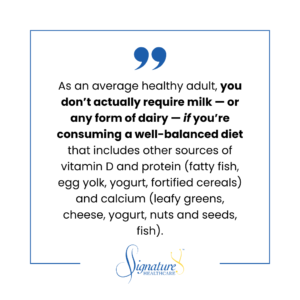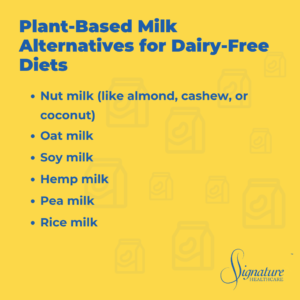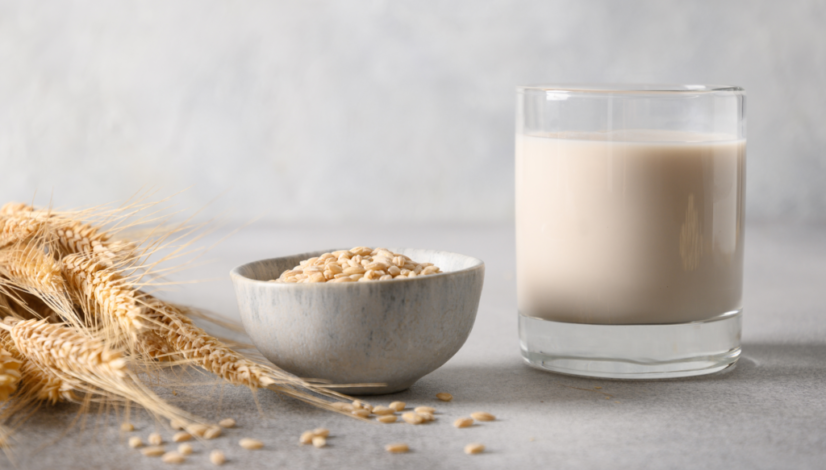From Cow’s Milk to Plant-Based Alternatives: What’s Best for You?
The last time a storm system headed your way, did you make a last-minute dash to the store for milk?! That’s a familiar refrain in many homes — 94% of U.S. households consider milk a staple and want to be sure they never run out.
But why do we find it so necessary? Is milk good for you? Does it matter that you drink it, and if so, why?
Nutritional Value of Cow’s Milk
Cow’s milk has been a staple of American culture since long before the popular Got Milk? campaigns hit the airwaves in the early 1990s — a full century earlier, to be exact!
In the mid-1800s, pasteurization eliminated the hazardous bacteria that often contaminated raw cow’s milk and extended its shelf life. By 1893, distribution methods were streamlined, and pasteurized milk was suddenly a healthful, affordable source of protein for everyone.
But despite its long history, how many of us today are truly aware of milk’s nutritional makeup and how it benefits us? How is milk good for you?
For adults, a cup of cow’s milk provides:
- 10% to 25% of the daily recommended allowance (RDA) of vitamin D (more for children)
- About 25% of the RDA of calcium
- Eight grams of protein
Together, these components deliver energy to our bodies, support bone health, immunity, cell growth and muscle mass, and may protect against certain chronic diseases.
And milk doesn’t just come from cows. Increasingly popular plant-based milks are also typically fortified with similar amounts of vitamin D and calcium during processing. But most have much less protein than cow’s milk — only about a single gram per cup (unless they contain some measure of soy or pea protein).
Health Risks of Cow’s Milk
Cow’s milk is often referred to as the ideal beverage, but when you’re considering “Is milk good for you?” there are a few potential health risks for some individuals:
- The biggest caution is lactose intolerance, which can trigger gastrointestinal problems such as gas, diarrhea, bloating, and stomach pain. Besides these concerns, an intolerance of all dairy can also cause dermatologic issues, like rashes.
- Whole milk is moderately high in calories and fat, so two or three cups per day may not be ideal for people who want to limit their calories or whose health calls for a low-fat diet.
- The lactose in whole milk, a naturally occurring form of sugar, is not considered bad for our health. However, most flavored milk varieties (think chocolate milk) and many plant-based milks often contain substantial amounts of added sugar, which may not be good for certain people.
Low-calorie and low-sugar plant milks are a good alternative for individuals who are keeping an eye on their intake of added sugars and calories.
Who Needs Milk Most?
As an average healthy adult, your nutritional needs do not require milk — or any form of dairy — if you’re consuming a well-balanced diet that includes other sources of vitamin D (fatty fish, egg yolk, yogurt, fortified cereals) and calcium (leafy greens, cheese, yogurt, nuts and seeds, fish).
But for children and our aging population, milk’s nutritional value plays a deeper role. Both kids and the elderly need a good, consistent source of vitamin D and calcium to build and maintain strong bones. Whole milk specifically is the best option for children, as the fat is critical for developing young brains.

The Dairy-Free Movement
Some scientists and scholars believe that humans should consider reducing the consumption of livestock-related products for a couple of reasons:
- Intolerance: As we age, the body produces less lactase, the enzyme that helps break down the lactose in milk. In fact, it’s estimated that nearly 7 in 10 adults eventually experience at least a mild genetic lactose intolerance or a sensitivity to dairy. (These sensitivities are common in Asian and African cultures, and Asian cuisines largely exclude milk and dairy.)
- Environmental interests: People concerned about animal welfare and the ecological footprint left by cow’s milk production often find plant-based milks more eco-friendly. Producing milk from plants affects fewer natural resources (land and water) and contributes less to the greenhouse effect.

People who can’t consume cow’s milk — or prefer not to — can choose from a variety of dairy-free, plant-based alternatives:
- Nut milk (like almond, cashew, or coconut)
- Oat milk
- Soy milk
- Hemp milk
- Pea milk
- Rice milk
When You Choose Milk
Here are a couple of final reminders when choosing the variety of milk that works best for you and your family:
- Avoid added sugars. Look for an unsweetened or low-sugar milk.
- Find what tastes good to you and meets your nutritional needs. If you want to move from cow’s milk to plant-based milk, be sure to get a good balance of vitamin D, calcium, and protein from other foods you consume.
Still wondering, “Is milk good for your health?” Finding you’re less tolerant of cow’s milk as you age? Curious about plant-based milks?
At Signature Healthcare, we can provide guidance on varieties of milk, healthy meal planning, and other nutritional interests. Let’s talk!

Natalie Mokari, RDN LDN
Natalie Mokari is a skilled dietitian with a Bachelor of Science in Food Science and Human Nutrition from Clemson University, complemented by a dietetic internship in Charlotte. Her expertise spans outpatient clinical nutrition, private counseling, corporate wellness, and school food service, emphasizing a non-diet approach and mindful eating. Outside the clinic, she relishes trying new recipes, outdoor activities, traveling, and exploring Charlotte with her husband and dog.
Get the latest News
Join the Signature Healthcare Newsletter to get the latest articles, resources, and news delivered directly to your inbox.

